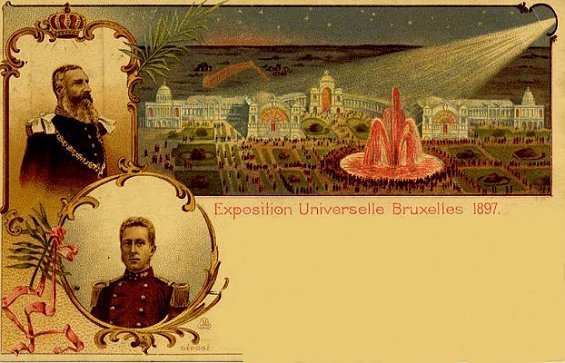Belgium
History of Film IndustryBelgium played a major role in the initial spread of the film industry. The first presentation was in Brussels, Belgium on November 10, 1895 at the Ecole Superieure de l'Industrie to the Belgian Photographic Association, organized by Charles Moisson who was the Lumiere Bros chief mechanic. The first public showing took place on March 1, 1896 at 7 de la Galerie du Roi, called the Kings Gallery, in Brussels. The ticket price was one franc.

In 1897, Paris photographer Albert Drains set up a film company called Optique Belge. Drains met and worked with Jean Alexandre Louis Promio, who was the most famous of the Lumiere operators.
They worked together there on several projects. Drains produced the first film in Belgium was Le Marche aux poissons de Bruxelles, in 1897. There seems to be some confusion as to credit of who actually did what (with Drains being referred to as 'Alexandre' in several reports) , but the purpose of this venture was in preparation of the 1897 Brussels Worlds Fair.
Numerous films were shot and shown of exhibits and surrounding events. This also opened up contacts for presentations around the world, which was a major boost to the infant industry, and can take a lot of credit for the speed that the industry reached around the world.
The same year, Belgium director
Hippolyte De Kempeneer made his debut with King Leopold II at the Tervueren
Exhibition.
After the Worlds Fair, all production ceased for a number of years while the Pathe empire grew. During the middle 1900s, Pathe began building cinemas in Belgium as an extension of his French operation. Alfred Machin founded the first production studio in 1909, which was a film production subsidiary of Pathe. De Kempeneer resumed his directing career at that time and directed numerous documentaries before the war. Machin's most famous film was Maudite soit la Guerre (A curse on War) which was released in 1913 just before the start of WWI in 1914 (some of his films are still preserved in the Royal Filmarchive in Brussels).
During the war Machin and De Kempeneer produced and directed numerous documentaries. After the war, this continued until 1919. Machin changed to producing animal documentaries. De Kempeneer opened his own production studio, Compagnie Belge des Films Cinematographiques (CBFC). The oddity was that De Kempeneer had only directed documentaries. His studio, CBFC, produced dramas and comedies which De Kempeneer produced but never directed. CBFC released numerous films until 1923 when the studio burned down. De Kempeneer didn't rebuild and didn't produce or direct another film until one final documentary in 1941 called Belgium Forever. Unfortunately the Germans seized the country and the film. De Kempeneer's sons managed to reconstruct the film from original records and grant it a theatrical release in September 1944, one month after their father's death.
The early and mid 20's brought the same finacial crisis to Belgium that it did to the majority of Europe. American films dominated the cinema screens and Belgium joined the Film Europe movement that Germany and France were promoting. However, Belgium didn't benefit from it, producing only 4 films in 1924.
The 1930s saw a resurgance toward re-establishing the film industry. The Belgian Documentary School was founded by Charles Dekeukeleire and Henri Storck to experiment with new filming techniques. This created a small amount of dramas but as the war was nearing, production became more and more dominated by documentaries which were mostly war related.
After the war, the general film production became stagnant with very little growth through the 1950s. The 1960s however, brought a new turn in Belgium co-operative films, such as Belgium-French or Belgium-German productions. Starting in 1964, some films were subsidized by the Belgium government, making way for a new generation of filmmakers such as Andre Delvaux , Roland Verhavert (Pallieter) and Harry Kumel.
By 1970, there were approximately 800 theaters in Belgium. Anything dealing with films was handled by the Ministry of Economical Affairs and the Ministry of Finance. Animation was an increasing area of interest with Raoul Servais leading the way. His Harpya receive the Palme d'Or at the 1979 Cannes.
By the 1980s, the population of Belium was approaching 10 million and the number of active cinemas had dropped to a little over 600. Film production in Begium only made up approximately 2-3% of the films shown in Belgium with approximately 1/2 of the films shown coming from the US and the remainer shared by its European neighbors.
Belgian cinema production increased during the 1990s, gaining international attention with such films as Man Bites Dog directed by Benoit Poelvoorde, Daens, directed by Stijn Coninx, and Rosetta directed by the Dardenne brothers. In 2000, Dominique Deruddere's Everybody Famous! was nominated for the Academy Award for Best Foreign Language Film.
Film production remains at the 3-4% level with US films dominating the Belgium screens at close to 80% of films shown.